The Biggest Talking Points at the 2025 AI4ALL Summit: Designing for an Inclusive Future
On November 5, 2025, around 90 attendees gathered for the AI4ALL Summit. Held in the cozy and inspiring Equals Amsterdam space, the summit was packed with visionary ideas, practical insight, and genuine connection. With 23 speakers across 12 sessions, the event brought together newcomers eager to learn and experienced professionals looking to be inspired by their peers. Their shared goal was to build an inclusive and responsible world where artificial intelligence enhances human potential, not replaces it.
Written by Myrthe van den Berg
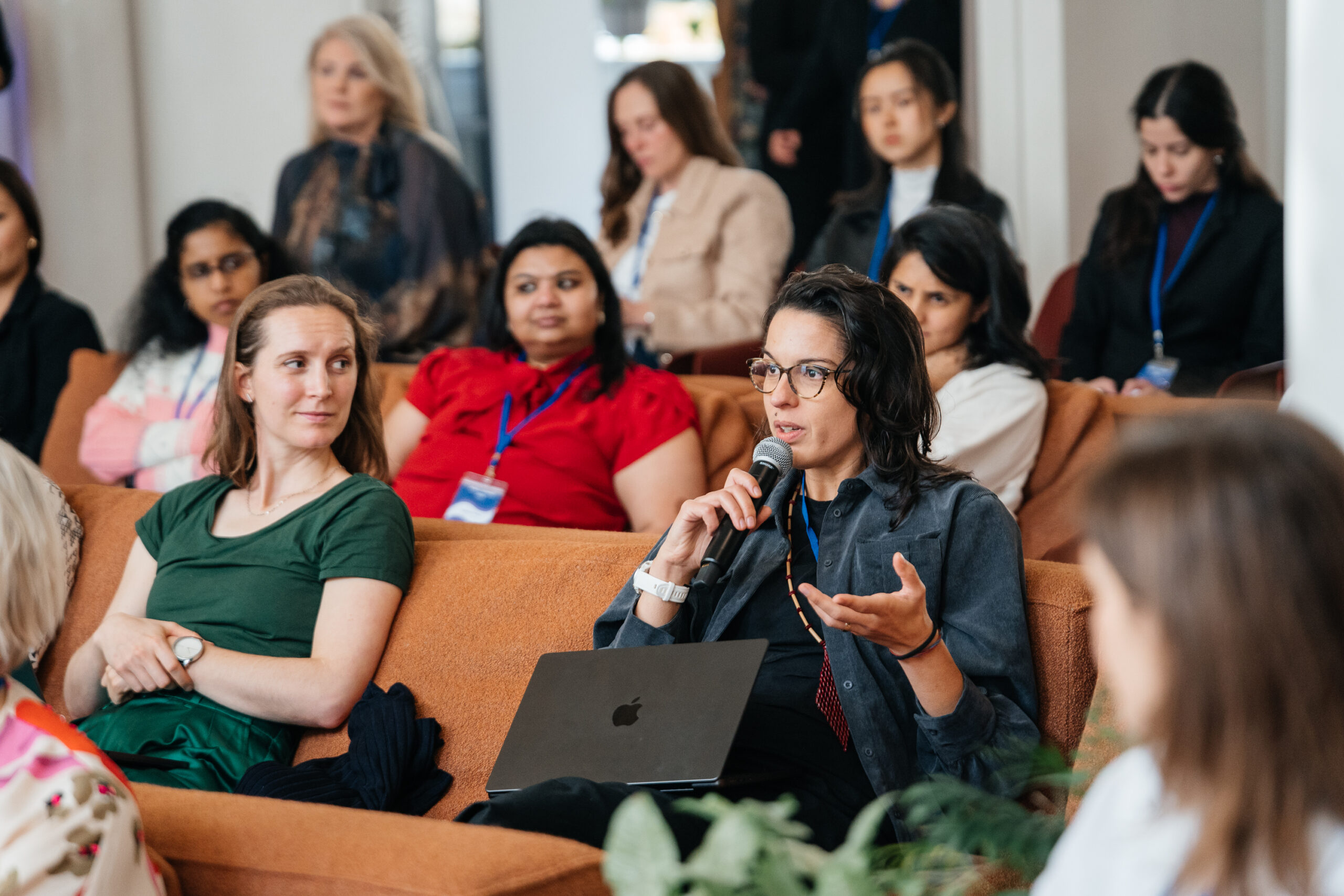
From rethinking how we design technology to exploring what it means to stay human in the age of AI, the Summit made one message clear: AI can only be as inclusive as the people who build it.
Here are the biggest talking points that left attendees inspired, challenged, and ready to create change.
From Bias to Balance: Building A Future That Includes Everyone
AI learns from data, and as Dr. Cara Antoine, Chief Technology, Innovation & Portfolio Officer at Capgemini, reminded us during the From Data to Design: Why AI Needs Women Everywhere panel, data is “history in numbers”, but history hasn’t always been fair.
“If we’re not written into the source code, we don’t exist,” she said. “Fifty percent of the world is represented by women. If we’re not part of the data, the algorithms and systems that shape our future will not represent us.”
Antoine illustrated this with striking examples, from heart attack research historically based on male symptoms to protective gear designed for men’s bodies. “When I worked at Shell,” she recalled, “my protective clothing didn’t fit. I couldn’t have run through a facility if it caught fire. That’s how design bias shows up in the real world.”
Her call to action was clear. “Let’s stop designing for women. Let’s start designing with women.” To this end, she also changed her own approach. “I’ve stopped talking about allies and started talking about advocacy. We don’t need more cheerleaders. We need people willing to take action.”
Miriam McCabe, Senior Director at Salesforce, captured the same idea from a complementary angle. “Let’s design a future where the outcomes of the models represent the society we want to live in, not the society we actually live in.”
This message about creating change echoed throughout the day, particularly in conversations about healthcare and data bias.
“We have to make the invisible visible.”
That was the central message from Melissa Ablett-Jordaan, Founder of Sibyl, who spoke about the “invisible experiences” of women’s health — symptoms, pain and conditions too often dismissed or under-researched.
“When data doesn’t capture women’s full experiences,” she explained, “the technology built on it inherits those blind spots.”
Dr. Nupur Kohli, Medical Doctor and AI in Healthcare Advisor, built on that idea, highlighting the importance of interdisciplinary collaboration.
“True healthcare innovation must be co-created with researchers, clinicians, and caregivers. AI can support that process, but empathy, diversity, and lived experience must lead.”
Their talks underscored how data gaps translate into health gaps, and how inclusive research can change outcomes for everyone.
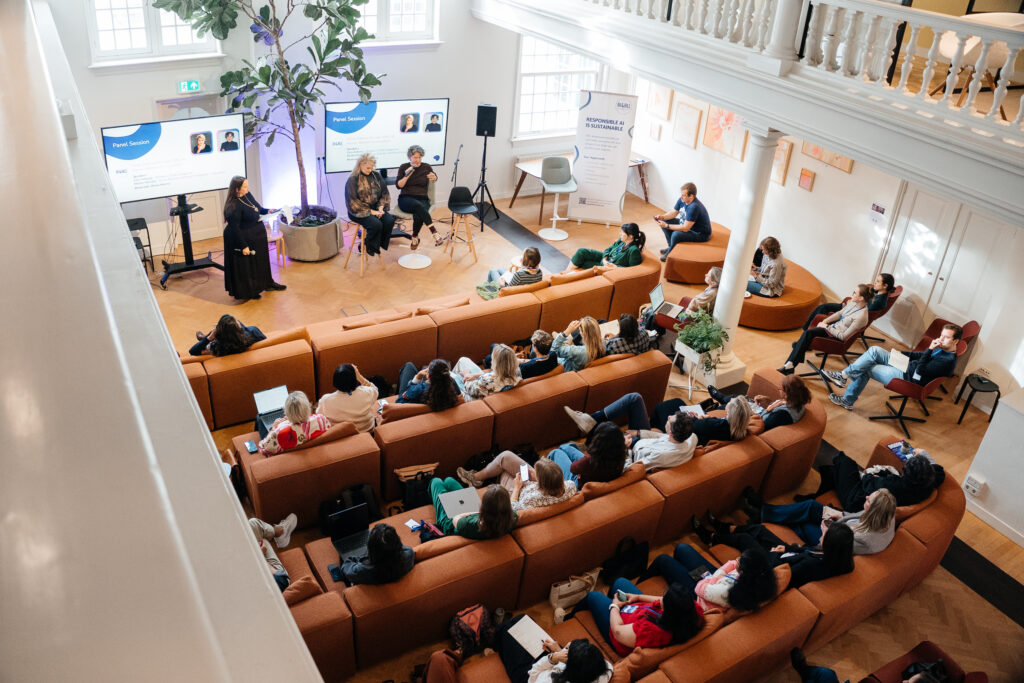
Rules or Roadblocks? Finding the Balance in AI Regulation
One of the most animated conversations of the day revolved around regulation.
On one side were those who warned of the dangers of unregulated AI. Christina Caljé, Founder and CEO of TINNT, raised concerns about “unchained AI,” open-source models that anyone can download and modify. “While openness fuels innovation,” she noted, “it also enables serious misuse.”
Waiting too long to enforce regulations also comes with consequences. In the AI for Earth session, the discussion raised a crucial question: “The last major internet regulations came after 9/11. Are we going to wait for our own catastrophe before we regulate AI?”
On the other side, others described how over-regulation can slow progress. During the AI4Her Health award nominees panel, these innovators shared stories of promising projects that never reached deployment because of complex compliance rules. “It’s frustrating that so much of our private lives is disclosed on Facebook,” Elisa Canzani, Data Science & AI Director at Philips, noted, “yet we can’t have permission to use someone’s blood pressure data in our research.” Marlies Schijven, Professor of Surgery at Amsterdam UMC, added, “We need to transition toward routinely asking patients to share their data.“
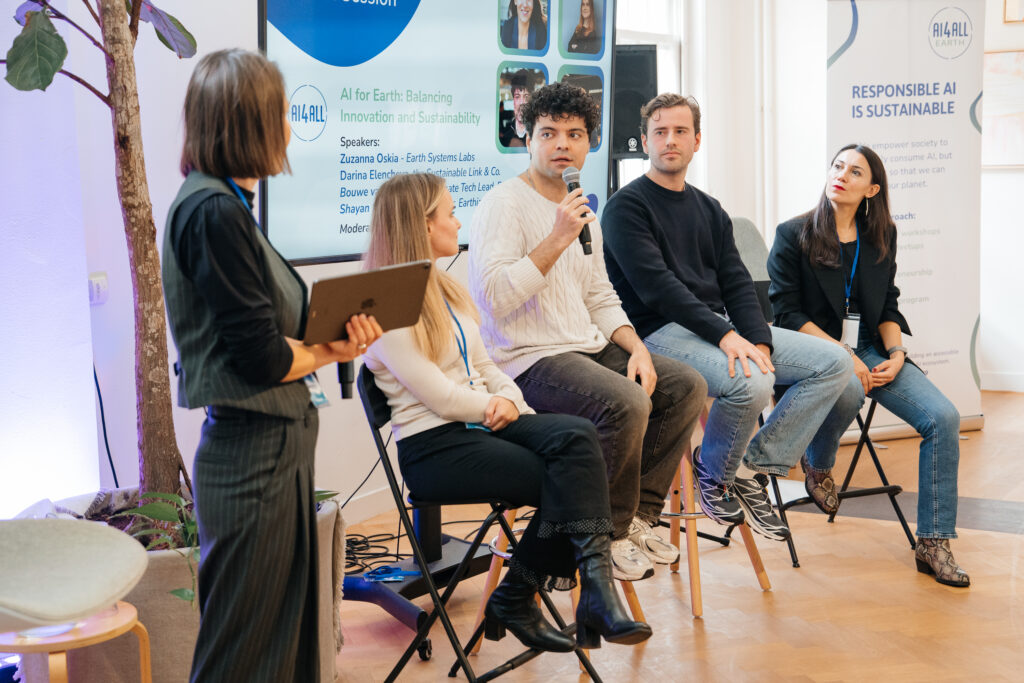
The tension between innovation and oversight was also evident in discussions about sustainability and global competitiveness. In the AI for Earth: Balancing Innovation and Sustainability session, Shayan Shokri, CEO and Founder of Earthian AI, offered a candid assessment of Europe’s position. “Europe leads in regulation, but lags in technology. To execute the rules, we need more power, which we don’t have. We should lead with technology first.”
This discussion highlighted a complex truth: AI needs rules that prevent harm, but also enough flexibility to encourage innovation.
Without Us, It All Falls Apart: Why Human Oversight Still Matters
In her keynote Future-Proofing AI: Building Knowledge, Access, and Agency, Iffat Rose Gill, Founder of The Code to Change, urged organizations not to lose sight of human judgment in their rush to automate. “Some companies replaced people with AI,” she said, “only to realize they had lost something essential. Without human oversight, we’re lost.”
Gill argued that progress depends on empowering people with knowledge, not jus thanding them new tools.
“Future-proofing AI isn’t about buying tools or banning them. It’s about breaking the monopoly on knowledge.”
She pointed to recent Dutch data showing that 44 percent of jobs are highly exposed to AI tools, yet only one in four workers receive proper training. “Stop waiting for permission to learn. If we don’t understand the system,” she warned, “we’ll end up being used by it.”
While AI systems are getting more integrated in our lives, Dr. Daria Morozova, Assistant Professor of Management and Organization, reminded us, in the session I, Human: On being Human Alongside AI, that machines may outpace us in logic, but not in imagination or intuition. She also highlighted the concept of situated humanness, which encourages individuals to embrace imperfections, stay attentive to their surrounding world, and acknowledge the role of embodiment in shaping human experience.
“Computers cannot fathom what happens where our imagination and intuition live,” she said.
If we nurture those qualities, we’ll always have a role that AI can’t replace.
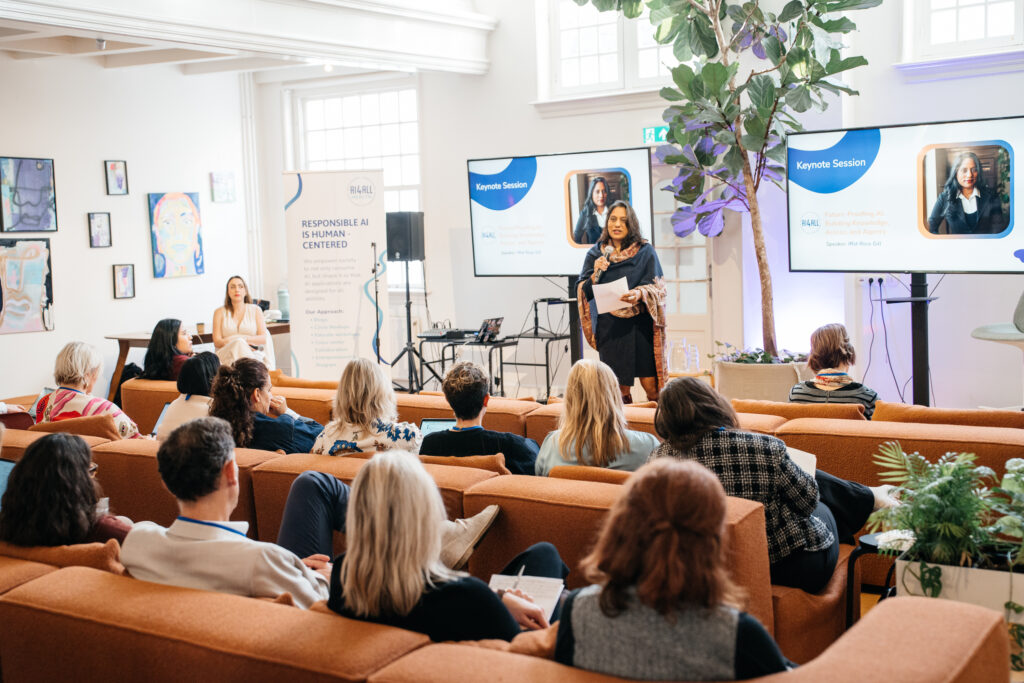
Everyone’s Turn to Learn: Bringing AI Literacy to All
Across sessions, speakers agreed that AI is no longer a niche; understanding it is now essential. AI literacy has become as fundamental as reading, writing, or basic digital skills.
During the AI4Her Legacy award nominees panel, Fiona Passantino, AI Integration Specialist and Executive Coach at Executive Storylines, offered a vivid analogy.
“In the Netherlands, every child earns a Zwemdiploma because water is part of everyday life. We teach kids how to swim, and they don’t drown. It’s that simple.”
She invited the audience to imagine the same approach to AI.
“Imagine a country where 100 percent of people have basic AI skills. How attractive would that be for innovators and companies?”
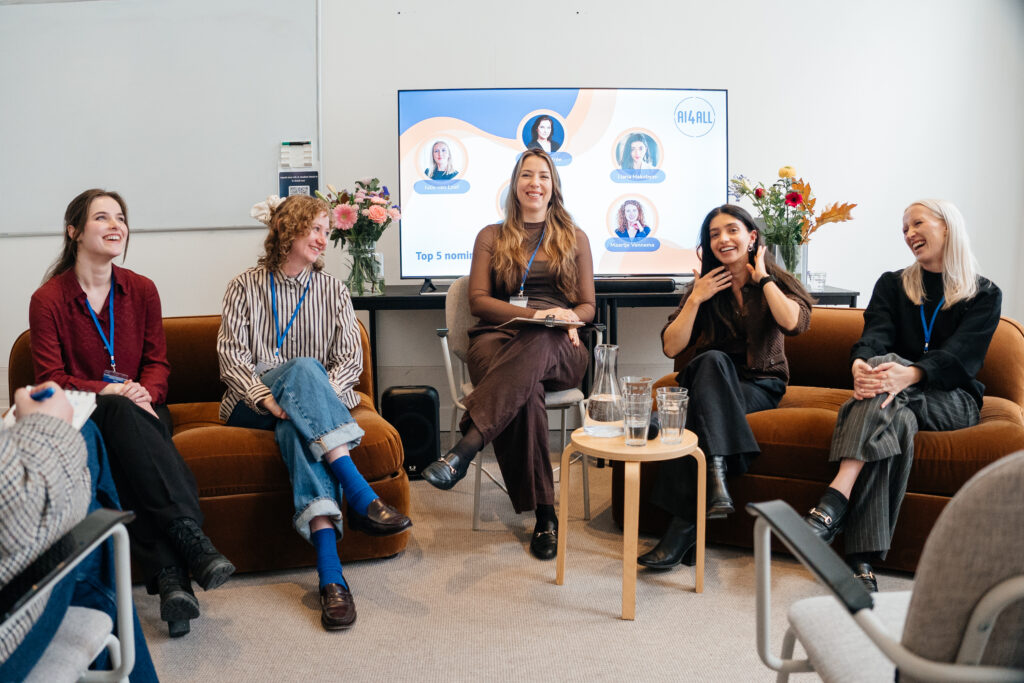
Passantino argued that AI education should be treated as a national priority rather than a niche interest. Governments, schools, and employers all share the responsibility ensuring citizens can navigate the AI era safely and confidently. Beyond formal education, a new wave of creators is helping people understand and use AI in more approachable ways.
During the AI4Her Future award nominees panel, Liana Hakobyan, Marketing Strategy Lead at Iris.ai, described how her LinkedIn series “The AI Habit” encourages people to learn through experimentation and community challenges.
“We make AI less mysterious by using it,” she said.
These creators are part educator, part guide, making AI knowledge more open and engaging. Several speakers, however, reminded the audience that with influence comes responsibility. Those creating AI content must hold themselves accountable for accuracy and ethics.
Through these communities, AI literacy is becoming more accessible, more inclusive, and ultimately more human.
Mentorship, Community, and Self-care: The fuel to keep going
Innovation does not happen in isolation, and throughout the day, speakers emphasized the importance of mentorship, peer networks, and supportive communities, especially for women and underrepresented communities pursuing AI careers.
Panels throughout the day reminded attendees that collective growth often outpaces individual effort. Inclusive spaces, both physical and digital, are where collaboration turns into innovation. It helps newcomers find their voice, offers professionals perspective, and keeps knowledge circulating in a fast-moving field. Sometimes it’s the small gestures that make the biggest impact, such as sharing opportunities, reviewing someone’s project, or amplifying their work online.

And alongside all the ambition, there was a consistent reminder to take care of ourselves while shaping the future. As Jana Wilhelmus, co-founder of AI4ALL, put it during the AI Role Models track, wellbeing is part of responsible innovation.
“Creating the future is demanding work,” she said. “Digital overload is real, and mental wellness isn’t optional. When we care for ourselves, we build a stronger, more sustainable tech culture for everyone.”
Her words underscored a theme that threaded through the entire AI4ALL Summit. Progress depends on people. When we invest in mentorship, build community, and make space for rest, we create a culture of innovation that can last.
At AI4ALL, this philosophy comes to life through our Circle events and Mentorship programs. We also keep our community informed and inspired through our newsletter and countless other initiatives. We’d love you to join us at our AI4ALL Gala to celebrate these efforts and the women driving progress in AI. Get your tickets here.
© AI4ALL | 2026
